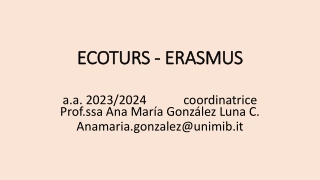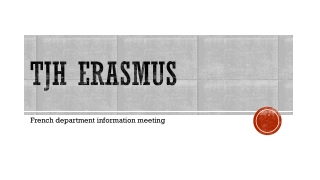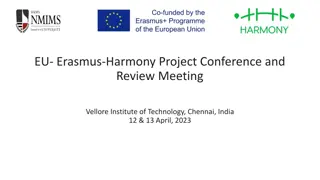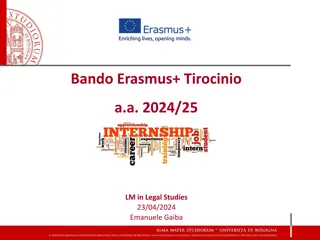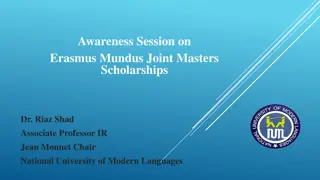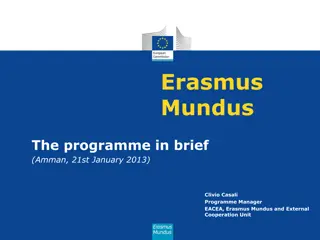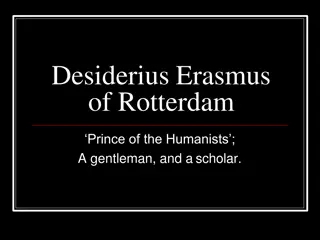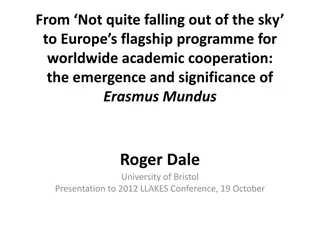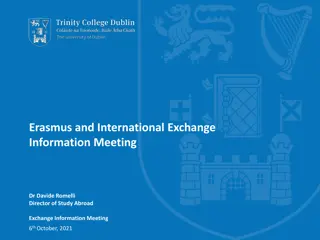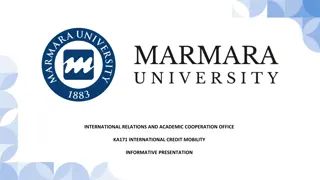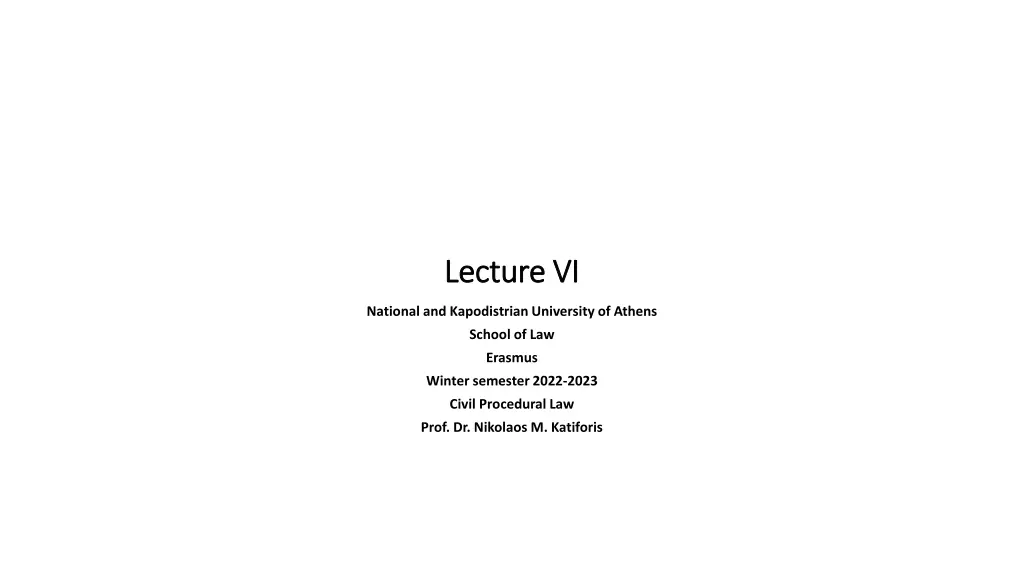
Civil Procedural Law Review Proceedings in Greece
Learn about cassation in Greek civil procedural law, including the conditions, grounds, and procedures for review proceedings in the National and Kapodistrian University of Athens School of Law. Understand the significance of cassation as an extraordinary legal method and its restrictions to points of law. Explore the detailed aspects of filing for cassation and the various grounds on which a review can be conducted, ensuring the correct application of substantive rules and procedural principles.
Download Presentation

Please find below an Image/Link to download the presentation.
The content on the website is provided AS IS for your information and personal use only. It may not be sold, licensed, or shared on other websites without obtaining consent from the author. If you encounter any issues during the download, it is possible that the publisher has removed the file from their server.
You are allowed to download the files provided on this website for personal or commercial use, subject to the condition that they are used lawfully. All files are the property of their respective owners.
The content on the website is provided AS IS for your information and personal use only. It may not be sold, licensed, or shared on other websites without obtaining consent from the author.
E N D
Presentation Transcript
Lecture VI Lecture VI National and Kapodistrian University of Athens School of Law Erasmus Winter semester 2022-2023 Civil Procedural Law Prof. Dr. Nikolaos M. Katiforis
4. Review Proceedings 4.6. Cassation 4.6.1. General Aspects: Cassation, as an extraordinary method, is restricted to points of law. 4.6.2. Conditions: (a) All final judgments of civil courts, whether rendered in contested actions, in default proceedings or in ex parte proceedings, are subject to a review by cassation, when ordinary methods are not, or are not any longer, available. A direct cassation on a judgment of a court of first instance is permissible as soon as this judgment is no longer subject to an opposition against default or an appeal. (b) When a party resides in Greece, the time period for filing a cassation is 30 days, starting from the next day after the date on which the judgment under review was served on the opposing party. This time period is 60 days if the party seeking review in cassation resides abroad, or is of unknown residence. In cases where no service of the judgment under review has been effected, there is a time limit for cassation of 2 years which runs from the date of publication.
4. Review Proceedings 4.6.3. Grounds for Cassation 4.6.3.1. A review in cassation is provided for, when a substantive law rule has been violated, including those that involve the interpretation of juridical acts, whether a statute law or a custom, a rule of Greek or of foreign law, a rule of internal or of international law (Art. 559 nr. 1 of the grCCP). Violation of a substantive rule is understood as encompassing a) the false interpretation and b) the erroneous application or non-application of legal norms. 4.6.3.2. The ground of cassation (Art. 559 nr. 19 grCCP) termed lack of legal base has allowed review of the kind of violation of substantive rules which has been traditionally characterized as an oblique violation . A judgment is considered as lacking a legal base whenever the considerations on the findings of facts therein contained are se defective, inconsistent or insufficient that Areios Pagos cannot examine whether a given rule of substantive law has been correctly applied or not, to the relevant facts.
4. Review Proceedings 4.6.3.3. The grCCP provides also for a list of 18 exclusively specified procedural grounds, involving: a) the composition of the court below; b) the jurisdiction of civil courts and their subject matter competence; c) some fundamental procedural principles, i.e. the right of defence, publicity of the proceeding, the rules involving the free disposition of the parties, and the principle of party presentation; d) some institutions of the law of evidence, i.e. the conclusive proof produced by certain means of evidence, the rules governing allocation of the burden of proof and the distortion of a document amounting to the lower court s holdings apparently and entirely different from a document s clear contents; e) the existence and the binding effects of judgments, e.g. violations as to the binding effect of res judicata; e) procedural nullities, exclusion from procedural rights or the admissibility of procedural acts. 4.6.3.4. Additional grounds of cassation can be admissibly indicated through an additional complaint which must be filed with the clerk of Areios Pagos and, moreover, served on the opposing party at least 30 days before the hearing. 4.6.3.5. Cassation in the Interest of the Law : Following the French prototype, the grCCP grants the Public Prosecutor of Areios Pagos Authority to act as a true party and file a cassation in the interest of the law against any decision of civil courts, even not reviewable through a normal cassation by a party, or despite the expiry of the time limitations provided for the cassation by a party. It does not affect the parties.
4. Review Proceedings 4.7. Reopening of Judgments 4.7.1. General aspects: Reopening of Judgments, as an extraordinary method of review, basically follows the French requete civil rather than the german Wiederaufnahme des Verfahrens . It serves to overthrow the binding effects of res judicata in an extremely limited number of cases. 4.7.2. Conditions: Final judgments of civil courts, which are a formal res judicata, can be challenged by the extraordinary method of Reopening of Judgments, whether rendered in contested actions, in default proceedings or in ex parte proceedings. 4.7.3. Grounds for Reopening: They are generally intended either to remedy grave procedural errors, or to protect privileged groups of persons (infants, incompetents etc.) not properly represented, or, finally, to sanction the fraudulent conduct of a party.
4. Review Proceedings 4.7.3.1. Of a genuinely procedural nature: (a) Inconsistency of judgments; i.e. when a subsequent judgment producing the effect of res judicata contradicts an earlier judgment producing this same effect rendered by the same or a different court in a proceeding as between the same parties and on the same cause of action. (b) Inadequate representation of a party, unless a subsequent consent of this party has covered the defects, or improper representation by the same party of more contrary interests. (c) Representation by an attorney without the proper authorization by the party, not covered by a subsequent consent. (d) Forged judgments. (e) The fraudulent use of an improper service of process on a party as if of unknown residence.
4. Review Proceedings 4.7.3.2. Connected to the substantive contents of the judgement: (a) Delivery of a decision based on a false testimony, or a false attestation by a party, on a false expert report, or on a false sworn attestation by a witness, on forged documents, provided that such misconduct has been established by an appealable criminal judgment. (b) Recovery of decisive documents after rendition of the attacked judgment, which could not be timely presented, either because of force majeure, or because the party was unaware of their existence during the trial and was moreover prevented by the other side or by a third party from obtaining knowledge of their existence or possession. (c) Unappealable rescission of the decision of the decision of a civil, criminal or administrative court, which supports the attacked decision, having occurred after the last hearing of the case, where the attacked decision was rendered. (d) Bribery of the judge having share in the rendition of the attacked judgment, or any other intentional violation of duty by this judge, which have substantially influenced its contents, provided that such bribery or such violation of duty have been established by an unappealable criminal judgment.
4. Review Proceedings 4.8. Third Party Opposition (Tierce Opposition): The procedural device granted to persons who were not parties to the action, for the purpose of attacking a final judgment that causes them prejudice or creates certain risks to their legal interests. 4.8.1. The first type of Third Party Opposition is open to all third persons who were not parties to the proceeding and are, hence, not bound to the res judicata effect of the attacked judgment. 4.8.2. The second type involves judgments which have become res judicata between the original parties and is given to third parties subject to this binding effect, on the condition that the attacked judgment has been obtained by fraud or collusion.
5. Evidence 5.1. Burden of Proof. 5.1.1. The allocation of the burden of proof: 5.1.1.1. General aspects: Accordining to an explicit rule (Art. 335 of the grCCP), only facts that are relevant to the outcome of litigation can constitute the subject matter of evidentiary proceedings. A court is, in principle, not allowed to rely on its private knowledge. It is, however, expected to take judicial notice of notorious facts and of facts that are known through another judicial activity. Furthermore, rules of common human experience must be applied by the court on its own motion and do not need to be proven. 5.1.1.2. Subjective and Objective Burden of Proof: The first one is related to the determination of the Party on whom rests the burden of producing sufficient evidence to court in order to justify favourable factual allegations. The second, is the risk of non-persuation, namely the burden of the party who will otherwise lose the case, unless he furnishes enough evidence to satisfy the court with the appropriate degree of conviction. 5.1.1.3. A court cannot refuse to decide a case, whenever neither party has produced sufficient proof to persuade it; the court is still obliged to render a judgment, which must be moreover be specifically reasoned. The outcome of an action in such a case largely depends on the rules governing the burden of proof. 5.1.1.4. The burden of proof presupposes a burden of alleging the relevant facts.
5. Evidence 5.1.2. Rules regarding the allocation of the Burden of Proof The grCCP provides for a general rule (Art. 338), according to which, each party is obliged to prove the facts which are required to support his self-contained claim or counter-claim . The application of this general principle has been connected to the procedure of the legal norms (german Normentheorie ). 5.1.2.1. Doctrinal distinctions of substantive rules with regard to the allocation of the burden of proof: (a) Constitutive are the legal norms that provide for the creation of rights (e.g. the rules providing for the formation of contracts or for torts). (b) Preventive are the legal norms that, despite the existence of the requirements of a constitutive rule, impede the creation of rights. (c) Restraining are the rules that postpone the effects of rights (e.g. rules providing for a guarantor s defence that his obligation is subsidiary and not effective until the creditor has attempted enforcement against the principal debtor). (d) Extinguishing are the rules that provide for the extinction of rights (e.g., payment).
5. Evidence While the requirements of constitutive rules must be proven by the party who claims the respective rights, fulfillment of the necessary conditions for the application of preventive , restraining and extinguishing rules must be proven by the party against whom a right is exercised. 5.1.2.2. Some Greek Authors and certain decisions have on special occasions accepted allocation of the burden of proof following other principles, i.e. the theory of the risk domains ( Gefahrenbereichen ). 5.1.2.3. The right to Counterproof: Evidence produced by a party who bears the burden of proof, called principal evidence, may be opposed by counter proof. This tends to overthrow the probative effects of the means produced by the party on whom the burden of proof rests.
5. Evidence 5.2. Admissibility of Evidence 5.2.1. Partly free evidence : On the basis of new Art. 340 grCCP, the court, in addition to the so called eponymous means of proof, may utilize, and evaluate, also means which should not be admissible under the requirements provided by the Code. 5.2.2. Direct and Indirect Evidence: Art. 336 3 grCCP explicitly allows that the court deduces conclusions as to unknown, but relevant facts, from proven facts only indirectly relevant ( indirect evidence or evidence through presumptions). 5.2.3. Preservative Evidence: Evidence produced before the order of the court for the proof taking had been rendered. It may be allowed following the proceeding of provisional remedies, if there is a danger that a means will be lost or that its utilization will become difficult.
5. Evidence 5.2.4. Free evaluation of evidence: Unless otherwise explicitly provided, the judge evaluates the means of proof freely and decides in accordance with his inner conviction whether the factual allegations are true. 5.2.5. Degree of Persuation: In normal cases, a court is expected to base its decision on a fully convincing evidence, according to human standards, which is characterized as complete . Objective theories regarding estimation of probabilities following mathematical or statistical methods have not been accepted in Greece, as not in compliance with the principle of free evaluation of evidence. Under circumstances specifically prescribed by statute, the court is allowed to be satisfied, if the truth of the alleged facts is shown as very probable (e.g. the evidence required for granting provisional remedies.


